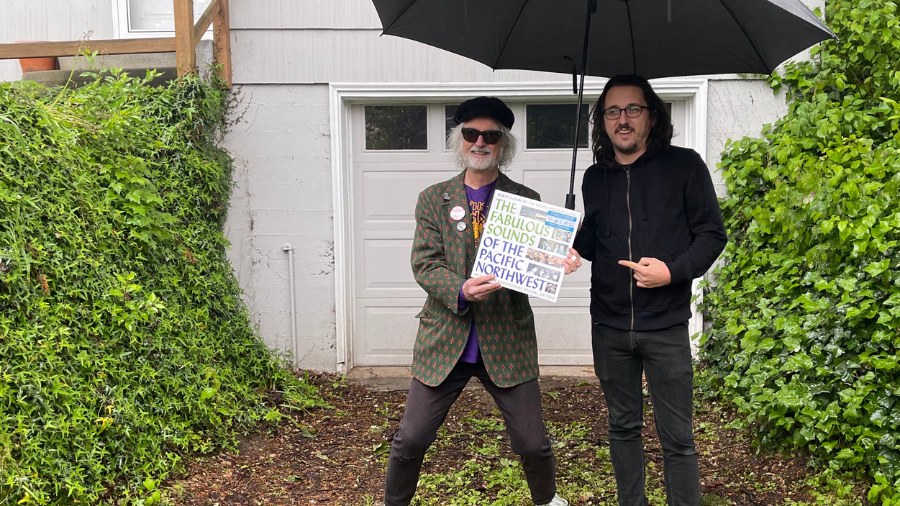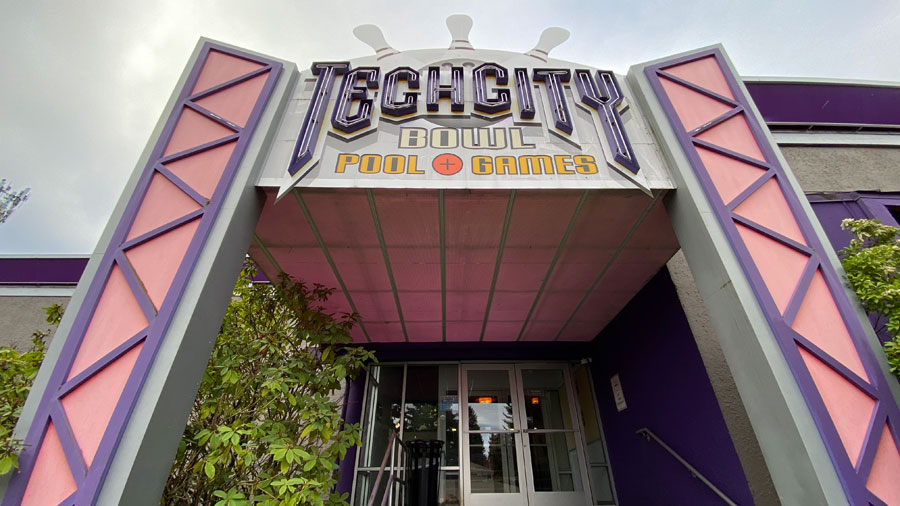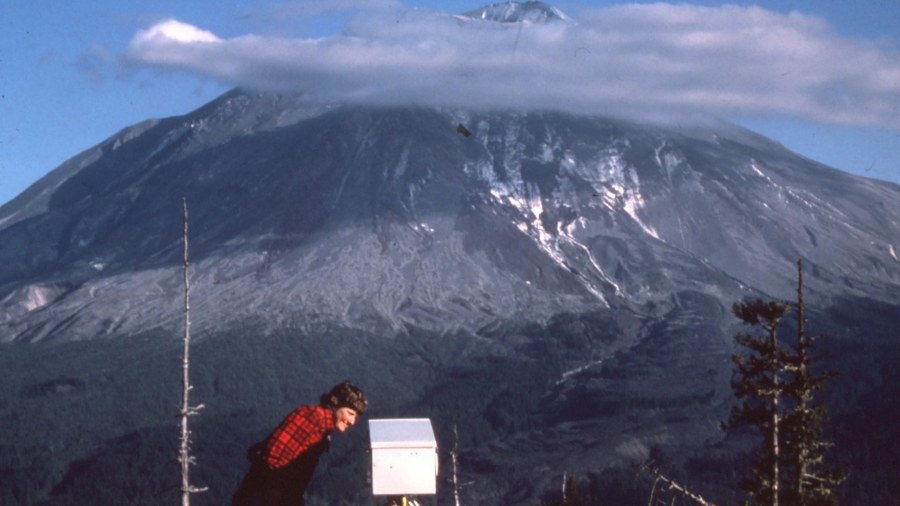The thousand-year-old origins of the name ‘Washington’
Feb 21, 2024, 4:16 PM | Updated: Feb 22, 2024, 7:48 am

An 1892 illustration by William Irving depicting Washington Old Hall, a structure on the ancestral estate in England of Washington namesake George Washington. (Image courtesy of Washington History Society of Washington, England)
(Image courtesy of Washington History Society of Washington, England)
The Presidents Day holiday was observed this week for the three-day weekend, but the actual birthday of George Washington, namesake of The Evergreen State, is Feb. 22.
It has become something of a local radio tradition to talk about George Washington on Seattle’s Morning News every February. This year, we present a refresher on how our state came to be called “Washington,” as well as a deeper dive into the actual meaning of that most famous of American surnames.
From Columbia to Washington
Washington Territory was carved from Oregon Territory when American residents north of the Columbia River who had recently displaced Indigenous communities and driven out the British influence of the Hudson’s Bay Company wanted more control over their political destiny. The territory was officially created in March 1853 when lame duck Whig Party President Millard Fillmore signed the bill into law a few days before he left office – back when Inauguration Day took place on March 4 rather than Jan. 20.
Fillmore had served as vice president under President Zachary Taylor, but Taylor died in office in 1850. At the Whig Convention in 1852, Fillmore sought to be nominated again to seek another term, but Gen. Winfield Scott was chosen instead, and then lost the election to Franklin Pierce. Between the convention and Pierce’s inauguration, Fillmore was a lame duck for eight months.
More from Feliks Banel: Young aviator’s rediscovered photo albums are full of history, mystery
The new territory was supposed to be called “Columbia” after the river – which had been named by American merchant Robert Gray after his ship in 1792. Over the decades, “Columbia” had also become one of the names for the region drained by the mighty river – which is why the Canadian province (and former British colony) mostly north of the 49th parallel is called British Columbia.
The name switcheroo for Columbia Territory came at the last moment when a helpful member of Congress from Kentucky suggested honoring the first president by calling the new territory “Washington” – regardless of the fact that the nation’s capital already had been called a similar name.
U.S. Rep. Richard H. Stanton was that helpful lawmaker from the Bluegrass State whose reputation is somewhat tarnished. Just eight years later, during the Civil War, Stanton was accused of assisting rebel recruits who wanted to sneak out of Kentucky and join the Confederate Army and then come back and attack. Stanton was eventually arrested and sent to prison, but was released fairly quickly after he swore a loyalty oath to the United States.
As for the reputation of our territory’s (and then state’s) namesake, it’s no secret that George Washington kept enslaved people at Mount Vernon, his Virginia estate. This fact, and so many realities and unresolved legacies of 18th and 19th century United States history, have not aged well. However, some historians believe Washington evolved and changed his views on slavery, and we know he did free those enslaved persons when he died.
The name Washington dates back hundreds of years
And as for the name “Washington,” it appears to have been first attached to a community in northeast England about a thousand years ago. This Washington is about 275 miles north of London, and about 110 miles south of Edinburgh. It was traditionally a coal mining area in the 19th and early 20th centuries, but became industrialized decades ago and attracted new manufacturing, including a big Nissan auto plant.
The town of Washington is where George Washington’s English ancestors are from, and part of an estate the Washington family lived in until about 600 years ago is still standing. It’s been restored, and is now owned by the National Trust – the government agency that manages historic properties – and is open to the public.
Ged Parker is chair of the Washington History Society. Parker told KIRO Newsradio that the building associated with George Washington’s ancestors is a very old and very modest stone structure known as “Washington Old Hall.”
“The Old Hall is a relatively small manor house,” Parker said. “If you were to visit here, you’re done and dusted within the hour. We’re not talking about a grand property with lots of rooms and lots of things to see. But it’s like a little gem.”
All Over The Map: Forgotten original ‘Unity’ name still inspires Ilwaco
Washington Old Hall has hosted many dignitaries from the United States, including President Jimmy Carter in 1977.
“And of course, we get lots of American visitors who, when they’re in the U.K., and if they’re following the National Trust properties, they’ll spot this reference to George Washington, and do a little diversion to go have a look,” Parker said.
The first ancestor of George Washington to come to North America was his great-grandfather John Washington, who arrived in 1656. Back in England, Ged Parker says the Washington family had actually moved out of Washington Old Hall much earlier than that.
“The Washington family itself left it by the end of the 1300s,” Parker said. “And so it’s a couple hundred years later that the Bishop of Durham purchases it for his for his grandson. And in essence, it gets remodeled then.”
“So although it’s got some elements that go back to the Norman times or maybe earlier, the majority of it was put together in the 17th century,” Parker continued. So, when they visit “we tell our American friends that most of it is fake,” he said, chuckling.
Beyond the historic structure of Washington Old Hall, the most fascinating part of this story is the fact that George Washington’s surname – and, thus, the official name of the Evergreen State – both come from that community.
The notion and form of surnames were solidifying around 800 years ago, says Ged Parker, which is around the same time that one of George Washington’s ancestors settled there, purchased an estate, and adopted the existing name of that estate as his surname, becoming Sir William de Wessyngton (which is, of course, a variation of “Washington”).
Ged Parker says it’s possible to analyze the syllables and come up with a meaning for one of the most famous names in American and, since 1853, Pacific Northwest history.
“We believe that the name ‘Washington’ dates back to Anglo-Saxon times,” Parker said, or more than a thousand years ago. “And if you pick it apart, it’s in sort of three parts: ‘Wassa,’ the start of it, which is seen to be the possible name of a Saxon or possibly a Saxon leader or chief. And “inga,” (which means) very simply ‘the family of.’ And then, as is very common in lots of place names, ‘ton’ (or) ‘town.'”
“Putting the three together,” Parker continued, “you’d say ‘the land or the area, the farm or so on, of the Wassa family.’”
There are other theories about the origins of the name, but Ged Parker of the Washington History Society says the interpretation he shared is the one to which most people subscribe.
Northwest history: The origins of the only photo ever taken of Chief Seattle
Celebrating Washington’s birthday and another unique US holiday in England
Parker also says there are no plans to mark George Washington’s birthday this year, but there will likely be a big event in 2032 for the tricentennial. It’s easy to assume the same will be true in the Evergreen State to mark its namesake’s 300th birthday, as well as the 100th birthday of the not-so-eponymous bridge that carries SR-99 traffic over Lake Union and Fremont.
Washington Old Hall does hold one celebration every year that calls to mind the corny joke that involves asking an unsuspecting American “Is there a 4th of July in England?”
At Washington Old Hall, the answer to that would be an emphatic “yes.”
“We always have a July the Fourth ceremony that’s been running since 1956,” Parker said. “And it’s actually quite a big deal in terms of getting local schools along and local dignitaries. And if there’s any American that’s within sniffing distance, they are lassoed and brought here and have to say something.”
You can hear Feliks every Wednesday and Friday morning on Seattle’s Morning News with Dave Ross and Colleen O’Brien, read more from him here, and subscribe to The Resident Historian Podcast here. If you have a story idea or a question about Northwest history, please email Feliks here.













